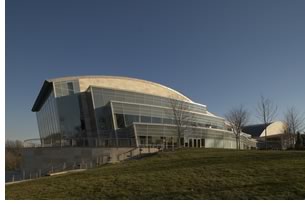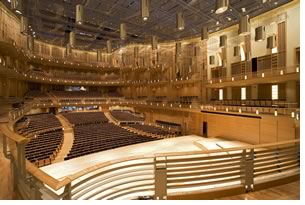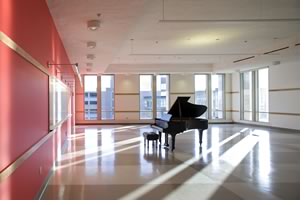

02/2005
 The Baltimore Symphony Orchestra (BSO) inaugurated its new Music Center
at Strathmore on February 5. The only major American orchestra to occupy
two year-round facilities in two major metropolitan areas, the BSO now
makes its second home in North Bethesda, a growing suburb of nearly one
million just north of Washington, D.C. Designed by Boston’s William
Rawn Associates Architects, with acoustician R. Lawrence Kirkegaard & Associates
of Chicago, the Music Center at Strathmore offers the community world-class
performance and arts education.
The Baltimore Symphony Orchestra (BSO) inaugurated its new Music Center
at Strathmore on February 5. The only major American orchestra to occupy
two year-round facilities in two major metropolitan areas, the BSO now
makes its second home in North Bethesda, a growing suburb of nearly one
million just north of Washington, D.C. Designed by Boston’s William
Rawn Associates Architects, with acoustician R. Lawrence Kirkegaard & Associates
of Chicago, the Music Center at Strathmore offers the community world-class
performance and arts education.
Rawn, architect of acclaimed Seiji Ozawa hall at Tanglewood in Lenox, Mass., notes that the 1,976-seat concert hall is much more typical of large urban cities than suburbia. Following the nascent trend toward establishing large cultural facilities in the suburbs, the BSO hopes to expand its reach and impact by attracting music-lovers from the District of Columbia, Northern Virginia, and suburban Maryland. The 11-acres site, which includes Strathmore Hall, an early 20th-century mansion turned arts center in 1983, has a lush and rolling landscape that presents a quiet contrast to the city din and nearby interstates 495 and 270.
Gracious and welcoming
The concert hall’s architecture is at once civic and welcoming.
Outlined by gentle, curving lines and an undulating roof, the formal
exterior gracefully blends into the hill behind, a measure of restraint
that both honors the tranquility of the pastoral setting and respects
the splendor of the historic house. The five-story glass façade
in the concert hall lobby looks out onto the placid landscaping, furthering
the sense of ease and tranquility.
 The six-story glass and German limestone
wall announces the site’s
public role as a facility for education in the fine arts. The Strathmore
education center, funded in good part with public monies, boasts two
major rehearsal halls, four classrooms, a sprung-floor dance studio,
and nine practice rooms. The center will offer classes for children and
adults, personal instruction, recitals, educational programs, and a place
for rehearsals for groups as varied and prestigious as the CityDance
Ensemble (considered the preeminent modern dance company in Washington,
D.C.), the Levine School of Music, and Maryland Classic Youth Orchestras.
The six-story glass and German limestone
wall announces the site’s
public role as a facility for education in the fine arts. The Strathmore
education center, funded in good part with public monies, boasts two
major rehearsal halls, four classrooms, a sprung-floor dance studio,
and nine practice rooms. The center will offer classes for children and
adults, personal instruction, recitals, educational programs, and a place
for rehearsals for groups as varied and prestigious as the CityDance
Ensemble (considered the preeminent modern dance company in Washington,
D.C.), the Levine School of Music, and Maryland Classic Youth Orchestras.
The concert hall’s auditorium is elegantly appointed with white birch walls, maple and aubergine velour seats, bronze mesh wall grilles, and alabaster art glass light fixtures. Honeyed maple floors span the entire auditorium (no carpeting here), augmenting acoustic performance. The spectacular undulating ceiling echoes the movement of the exterior roof. The auditorium’s traditional “shoebox” shape enhances the acoustics of the form and, to counter its severe lines, Rawn incorporates plenty of soft, curving lines throughout, resulting in a space full of intimacy and warmth.
 Adjustable acoustics
Adjustable acoustics
Although the acoustics are just now being tested with a full audience,
the designers report that the acoustics can be adjusted for any type
of concert by raising or lowering “tunable sound-absorbing curtains” behind
the grilles, thereby dampening or enhancing the sound. Additionally,
43 mechanized acoustical reflector panels, located above the stage,
can be adjusted as necessary. Acoustician Kirkegaard states, “At
its heart, the concert hall at the Music Center at Strathmore seeks
to rival the world’s best, providing a space with full, warm,
rich, open natural acoustics; a hall capable of conveying every subtle
nuance of musical expression from the quietest ‘candlelight moment’ to
the most powerful orchestral climax.”
The center’s opening concert series will feature a wide range of offerings from the BSO, Washington Performing Arts Society, the National Philharmonic, and others, with performances by internationally acclaimed cellist Yo-Yo Ma and sopranos Harolyn Blackwell and Janice Chandler-Eteme. Says Montgomery County Executive Douglas M. Duncan, “The Music Center at Strathmore will be an incredible asset and a true destination in our region. Strathmore’s integrated education center for music and dance will not only draw on the rich talent in the area, but will also provide students with the opportunity to learn from world-class visiting artists.”
Copyright 2005 The American Institute of Architects.
All rights reserved. Home Page ![]()
![]()
 |
||
Architect Acoustician Associate Architect Theatre Consultant
|
||
